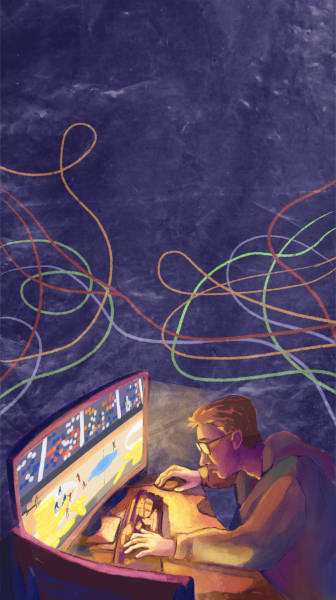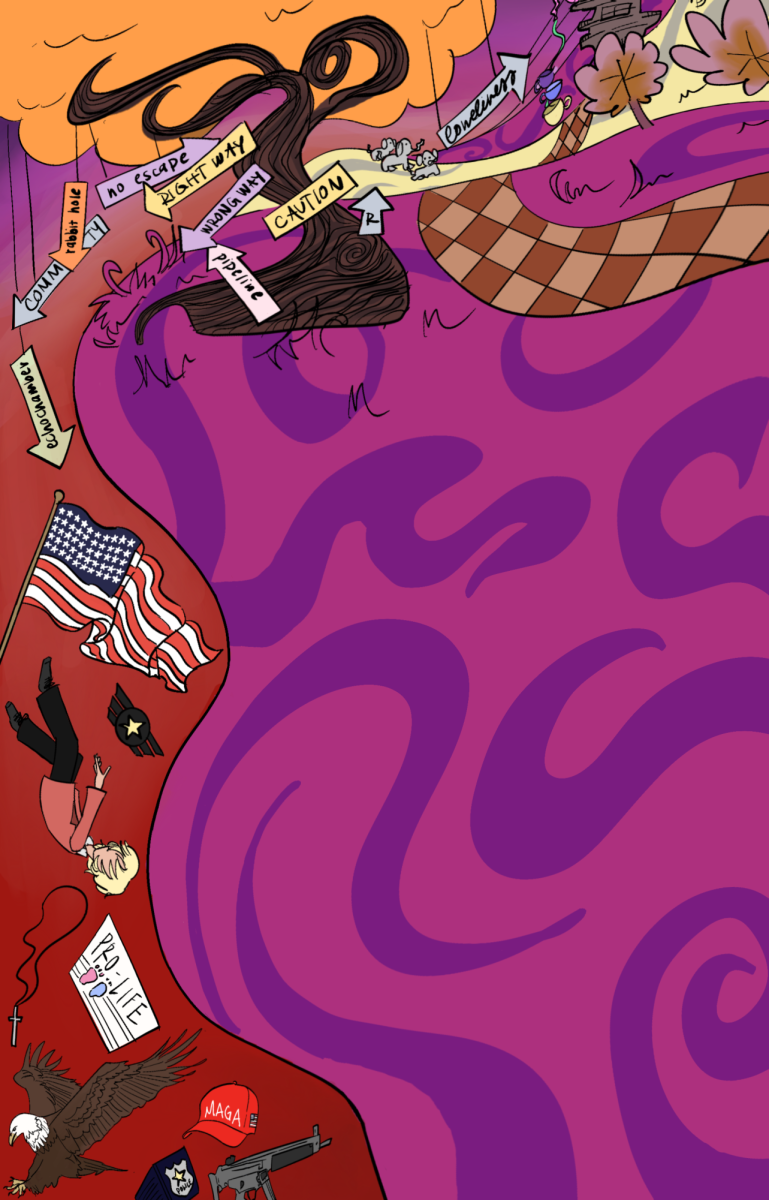
When Alex*, now a senior, made his first online sports bet in winter 2022, he was wracked with nerves at the uncertainty of how the Warriors would perform. Five dollars quickly disappeared as the plays he’d gambled on failed, but 16-year-old Alex was hooked and compelled to try again.
His second time, the rush of the reward hit. Alex made $15 after making bets on another Warriors game. That day, a new—and illegal—obsession started.
In California, online sports gambling (called pool or pari-mutuel betting, where many people’s bets are pooled) is legal only for those 18 and older. However, teens like Alex have found ways of bypassing these restrictions on online sites. Just 16 years old at the time, Alex turned to an illicit way of gaining entry into PrizePicks, a popular sportsbook app that requires users to be 19 or older.
“When my mom was working, I took her driver’s license and uploaded a picture of it to verify [my age],” Alex said. “I started because my friends told me it’s an easy way to make money.”
Online gambling, including sports betting specifically, has exploded in the past four years. According to a survey conducted by Statista, the number of online gamblers worldwide has more than doubled in the past five years, increasing from around 90 million users in 2019 to 176 million in 2023.
Alex continues to place daily bets on PrizePicks and other apps. He has steadily increased his spending on the apps in order to try to increase his winnings, funded by his earnings from a part-time job.
“When I first started, I put in $15 to $20 a day, and right now I put in maybe $300 to $400 a day,” Alex said. “I spend two to three hours a day watching clips and searching up past performances of the players. I mainly do it during [class].”
Dr. Mark van der Maas, an assistant professor at the Rutgers School of Social Work and member of the Rutgers Center for Gambling Studies, said that gambling is attractive to people because it taps into circuits in the brain that crave rewards. According to the American Psychological Association, winning a bet increases dopamine levels in the brain’s limbic system—the same neurotransmitter associated with substance abuse disorders. Because “winning” and getting that high occurs unpredictably in gambling, the habit is addictive—something known to psychologists as ‘interval ratio reinforcement.’
“The basic joy of taking a risk and getting a reward is an instinctual experience for people,” van der Maas said. “Making the distribution of that reward random is what our brains as mammals are designed to crave.”
Trevor*, a sophomore, said that when he first started betting, the memory of winning made him feel driven to keep gambling even after losing money.
“When you start to win and feel the rush each time, you increase your bet amount because it feels easy,” Trevor said. “The thought process when you start to lose is that you won before, why not do it again?”
Van der Maas said that young people are especially drawn to gambling because of their high affinity for risk-taking behaviors. He also said that the young brain’s highly vulnerable and emotional state may make adolescents more likely to develop a gambling disorder.
“Young people are much more interested in taking risks and they live a lifestyle that is typically more prone to risky behaviors,” van der Maas said. “Feelings of isolation we also know are on the rise for adolescents, and feelings of isolation can be very bad motivators to gamble. What we find in our research at all ages is that when someone gambles in order to deal with a negative emotional state, like loneliness or isolation or depression, that person is at much higher risk of developing a disorder for their gambling.”
When Alex won his first bet, he said the joy he felt compelled him to continue gambling.
“I felt really happy,” Alex said. “I thought this could be a long-term thing. I instantly thought about how I could do this again and just keep multiplying my winnings.”
The American Gaming Association reported that the sports betting industry (over 80% of which exists online) generated $10.92 billion in revenue in 2023, a 44% increase from 2022. Dr. Stephen Shapiro is a Sport and Entertainment Management Professor from the University of South Carolina. He said that since the legalization of sports betting in many states in 2018, the business has grown significantly, in large part due to successful advertising.
“The legalization of sport betting allowed leagues, teams, and media organizations to establish partnerships with sport gambling platforms,” Shapiro said. “The vast majority of leagues and teams have sponsorship and licensing agreements with gambling platforms, generating millions of dollars in additional revenue.”
These partnerships have infiltrated every aspect of sports broadcasting. According to Andrew Brandt, director of the Moorad Center for the Study of Sports Law, popular gambling platforms like FanDuel and DraftKings now sponsor every NFL team. Live broadcast commentators openly discuss gambling, and channels like ESPN feature advertisements for sports gambling platforms.
These partnerships have also become ubiquitous on social media.
Isaac*, a junior, said that he and his brother both got into online sports betting illegally after seeing online promotions and TikTok advertisements.
“[I watched] the advertisements and thought I could get into it,” Isaac said. “[It seemed] easy and simple. My [also underage] brother started doing it and then I started doing it.”
Common promotions for sportsbooks advertise “risk-free” bets where the amount users initially put in will be refunded with in-app credit. However, these ads are often misleading, since the actual money may not be returned to the user.
Trevor said that since the betting ads he saw on TikTok promised a sign-on bonus, it seemed like a no-brainer to try it out.
“It felt carefree because at first when you use someone’s code you get your minimum deposit of $10 doubled in credit cash for most websites,” he said.
Alex said that advertisements on his entertainment apps seemed to track his activity and suggest other online gambling platforms.
“That’s how I got introduced into [another] app,” Alex said. “When I started talking about betting with my friends, I kept getting all these ads on Instagram about apps and servers where people like to post their plays.”
Van der Maas said that the prevalence and phrasing of these online advertisements have contributed to the legitimizing of online sports gambling.
“Advertising almost always shows [online gambling] in a very positive, very fun light,” van der Maas said. “When people have that as the dominant message [about sports betting], it increases their positive feelings about that activity.”
Van der Maas also said the prevalence of online sports gambling in popular media has allowed the practice to become normalized in general sports culture. Unlike the societal taboos around addictive substances like drugs and smoking, the message around gambling has become less and less cautionary.
“Live advertising at sporting events and the inclusion of discussions of gambling in broadcasts is making it more and more difficult to separate sports betting and sports,” van der Maas said. “I think what we’re really seeing is an embeddedness of gambling in general sports culture.”
Jack* has never personally engaged in online sports gambling, but he’s observed the prevalence of gambling in sports culture. During his team’s season, Jack said many of his teammates talked about bets they were placing on NFL games.
“There’s probably 10-15 people I see sports betting out of 30 players on varsity,” Jack said. “There was this [person] on the team two years ago who was profiting on it and made a Discord [to show others his plays]. Then everybody started trying to do it, but they weren’t very successful.”
Van der Maas said that due to the enmeshment of gambling and sports fandoms, one social draw of online betting is that it may offer people a chance to test their knowledge of the game.
“What it seems that sports betting offers people, which is a little bit different than other kinds of gambling, is a chance to confirm their expertise in sports,” van der Maas said. “I think young males especially are [often] very interested in sports to begin with and this becomes another aspect that can become a chance to demonstrate expertise in their sports fandom. It really drives young people to get more involved.”
Alex said he believed he was becoming so proficient in online sports gambling that he introduced his friends to it and even created a server to charge people money to see the bets he was making.
“I introduced my entire friend group to [sports betting] and told them how to do it,” Alex said. “I also started a server so every time I make a play, I screenshot it and post it on there and then [my friends] can just copy it down.”
One risk of gambling is serious financial loss, beyond even what users have in their bank account. Most popular sportsbooks allow gamblers to use credit cards and thus rack up debt.
Another risk is developing an addiction. Dr. Lia Nower, an Associate Dean for Research, Distinguished Professor and Director at the Center for Gambling Studies at Rutgers University, said that gambling problems occur as a result of full immersion into the activity. She said that the move to online gambling has made it easier for gamblers to get hooked.
“The more activities you gamble on, the more sites or places you gamble, and the more frequently you gamble, the more likely you are to develop a gambling problem,” Nower said. “States that provide online access to gambling are providing access to multiple activities 24/7, which increases the chances people will gamble beyond their means. Since gambling is a progressive disorder, the more you do it and the more you lose, the more severe your problem can become.”
Van der Maas said that once gambling has reached an unhealthy point, it can be psychologically diagnosed as an addiction.
“When we talk about any behavioral addiction, the most commonly accepted definition is continued participation in that activity despite the experience of significant adverse consequences,” van der Maas said. “So, it’s really hurting you, but you can’t seem to stop.”
Trevor said that it was easy to keep gambling because of the excitement he would feel when winning bets.
“I could tell I was experiencing little bits of dopamine every time I would see a winning slip,” he said.
Although not everyone who gambles will develop a serious gambling problem, Nower said that gambling disorders typically have a sequence of stages: the winning phase, the losing phase, and the desperation phase.
“In the winning phase, you gamble every once in a while and you win sometimes,” Nower said, “That makes you want to go more, but the more you go, the more likely you are to form a habit. And, because the odds always favor the house, the more likely you are to lose more and more money. Then you go into the losing phase where you are spending more than you can afford. You start neglecting obligations, getting behind in your bills, [even] borrowing money. Finally, in the desperation phase, gambling takes over your life and you lose control. It’s not fun anymore but you are driven to do it. You may commit crimes to fund your gambling. You experience withdrawal when you can’t gamble. You might feel depressed, even suicidal.”
Isaac found himself losing excessive hours to sports betting, despite not being invested in every team he gambled on.
“Even if I bet on somebody that I didn’t like, I would watch that game to see how he does,” Isaac said. “I wouldn’t like the team. I wouldn’t watch it for fun.”
Van der Maas said that gambling addictions can have serious consequences on many aspects of a person’s life. These consequences can include a loss of money, deterioration of relationships, and a higher likelihood of mental health problems. According to a study by the Georgia Department of Behavioral Health and Developmental Disabilities, pathological gamblers were five to 10 times more likely to attempt suicide than people in the general population.
“It’s very easy to spend a lot of money on gambling in a very short amount of time,” van der Maas said. “Your personal relationships can start to get worse and worse over time. Gambling disorders can also have strong consequences for someone’s work or school life.”
Van der Maas said that the younger someone starts gambling regularly, the more likely they are to develop a gambling disorder. He advised people who are old enough to legally partake in online sports betting to be cautious, as the market is designed to be addictive and cause participants to lose money in the long run. For example, a 2024 Siena College Research Institute survey found that 18% of bettors said they lost money needed to meet financial obligations.
“These companies are not just [running their businesses] out of the kindness of their heart,” van der Maas said. “If you’re going to get into something like sports betting, you have to know that expecting to make a profit is not a very realistic goal to have.”
Trevor ended up quitting online sports gambling. He said though he won some money, Trevor believed that if he continued, he would lose it all, like he’s seen with many of his friends.
“I see people lose all the time,” Trevor said. “There is no one at our school that stays up [in their winnings].”
Van der Maas said that for current gamblers who are looking to quit, the best option is to seek help as soon as possible—one resource being the National Council on Problem Gambling website, which has a list of certified gambling counselors. Another is the organization Gamblers Anonymous, which allows addicts to find support from a community of other problem gamblers.
“[An addiction] doesn’t get better on its own,” van der Maas said. “[Professionals] are best suited to help you, but family support is very important—having someone that can help push you to solve your problems is really great. If you are having a little bit of difficulty stopping, it always gets worse, so the best thing you can do for yourself is seek help.”
*name changed








